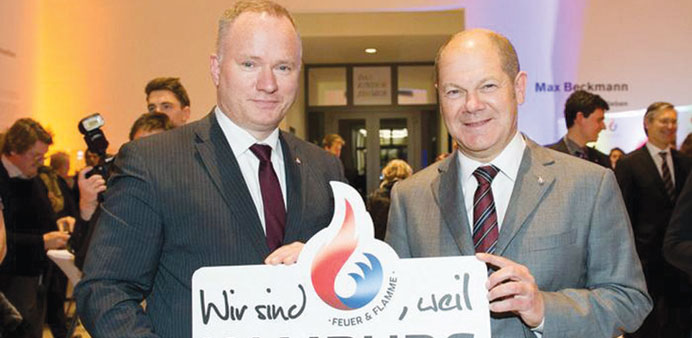DPA/Hamburg
Hamburg residents go to the polls tomorrow to decide on the northern German port’s bid for the 2024 Olympics, with officials hoping for big support and not another fiasco.
Germany has not hosted the Games since Munich 1972, and the latest attempt was stopped by a referendum in November 2013 which vetoed Munich’s bid for the 2022 Winter Games.
Hamburg and German Olympic officials hope for a big majority to boost the effort of the first-time bidders against Los Angeles, Paris, Rome and Budapest which will be decided by the International Olympic Committee (IOC) in a 2017 host city election.
“Every additional per cent (beyond 50 per cent) would be nice, helpful and a bonus,” German Olympic Sports Confederation (DOSB) president Alfons Hoermann told DPA.
Mayor Olaf Scholz said in Friday’s Bild paper that “a large majority raises our chances in the international contest.”
Hamburg offer a compact inner-city bid which is in line with the IOC’s Olympic Agenda 2020 which was set up to make future Games cheaper, more sustainable and more transparent. The Olympic Park is proposed in the Kleiner Grasbrook area in the harbour, just 10 minutes away from the city centre.
Landing the Olympics would allow Hamburg a long-desired leap across the Elbe river in its city development, with new residential areas in the Olympic village, the Olympic stadium downsized and the main indoor arena to be converted into a cruise ship terminal.
The bid is supported by most political parties, the local chamber of commerce and many sports clubs, while opponents include environmental groups and second division football club St pauli.
Surveys have shown that a majority in favour of the bid despite difficult times in connection with large numbers of refugees and migrants coming to Germany, security concerns in the wake of the Paris attacks, and various scandals in world sports ranging from corruption to doping.
A poll conducted ahead of the November 13 Paris attacks saw support dwindle from 63 to 56 per cent but another one by the DOSB afterwards saw a rise in support again to 60 per cent.
Hoermann spoke of a “now more than ever” mentality, and added that in testing times “it is even more important to formulate goals with an aspect of hope and to pursue them.”
Olympic bid flags and placards calling for support Sunday are omnipresent in the city, and two weeks ago some 10,000 people came to the Stadtpark green to form the Olympic rings.
Whether all efforts will be enough remains to be seen at the poll in Hamburg and at the sailing venue of Kiel.
After all, opponents have tried to make their presence felt and question marks have been raised around the proposed overall budget of 11.2 billion euros (11.9 billion dollars).
The figure is the highest of all bidders but Scholz has said that the highest possible figures were used. But some question whether 500 million euros is really enough for security, and the German government is yet to agree to shoulder 6.2 billion euros.
Scholz has stressed “reliable planning” and also highlighted that “many ideas and requests from residents could be taken into account” in the general planning process.
“Olympics will move Hamburg forward,” Scholz said.

